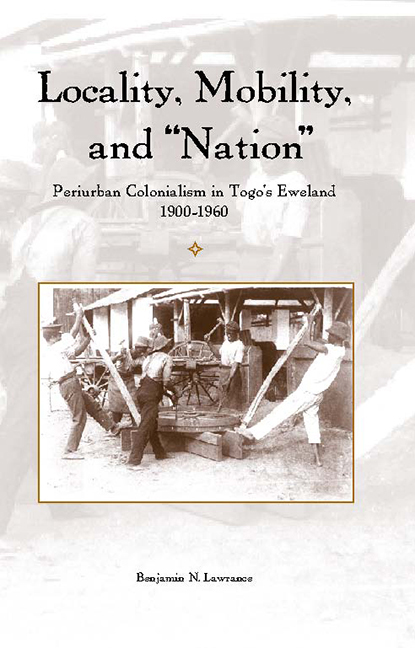Book contents
- Frontmatter
- Dedication
- Contents
- List of Illustrations
- Preface
- Notes on Orthography
- Map
- Introduction: Conceptualizing Periurban Colonialism in Sub-Saharan Africa
- 1 Mobility, Locality, and Ewe Identity in Periurban Eweland
- 2 Intervention and Dissent: Manufacturing the Model Periurban Chief
- 3 Crisis in an Ewe “Capital”: The Periurban Zone Descends on t he City
- 4 Vodou and Resistance: Politico-Religious Crises in t he Periurban Landscape
- 5 The German Togo-Bund and the Periurban Manifestations of “Nation”
- 6 From Eweland to la République Togolaise: Le Guide du Togo and the Periurban Circulation of Knowledge
- Epilogue
- Notes
- Bibliography
- Index
6 - From Eweland to la République Togolaise: Le Guide du Togo and the Periurban Circulation of Knowledge
Published online by Cambridge University Press: 11 May 2017
- Frontmatter
- Dedication
- Contents
- List of Illustrations
- Preface
- Notes on Orthography
- Map
- Introduction: Conceptualizing Periurban Colonialism in Sub-Saharan Africa
- 1 Mobility, Locality, and Ewe Identity in Periurban Eweland
- 2 Intervention and Dissent: Manufacturing the Model Periurban Chief
- 3 Crisis in an Ewe “Capital”: The Periurban Zone Descends on t he City
- 4 Vodou and Resistance: Politico-Religious Crises in t he Periurban Landscape
- 5 The German Togo-Bund and the Periurban Manifestations of “Nation”
- 6 From Eweland to la République Togolaise: Le Guide du Togo and the Periurban Circulation of Knowledge
- Epilogue
- Notes
- Bibliography
- Index
Summary
Le Guide du Togo, the sole Togolese newspaper, founded before the Second World War, also published after the war, shows clearly the evolution of political ideas and the elite of Togo: before 1940, it sought as close an assimilation as possible with the metropole; after 1945, France having not responded to its aspirations, it reoriented itself toward the achievement of independence.
—Raymond Guillaneuf, “La Presse au Togo (1911–1966)”In January 1933 market women stormed the home and garden of Mr. and Mrs. Jonathon Savi de Tové. The house was looted, the home gutted, and their well filled with rubbish and excrement. The protesters proclaimed, “We're making war on Savi! We're making war on the French!” The priest-esses of Bè turned their naked buttocks toward his house and skidded along the ground, inflicting a curse. According to Dossi Ekué-Attognon, Savi “was punished thus for his complicity with the government.” As the secretary of the Conseil des Notables, with an “indemnity of 300 francs,” Savi de Tové was singled out for special punishment. In a letter to Governor de Guise, Commandant Jean Bouquet stated that “a certain number of distinguished natives are waging a violent campaign against the Conseil des Notables and in particular those participating on the Economic Council, notably Mr. Savi de Tové whom they accuse of treason… . [T]his campaign has surpassed the simple form of political polemic and is now causing a state of overexcitement among the general populace.” When calm returned to Lomé, Savi de Tové's first act was to seek compensation from the French administration for possessions looted and destroyed, including stolen cash and jewelry, and remuneration for rebuilding his home. In his view, because he was a servant of the French administration, they were morally bound to protect him.
Over the next few years, Savi de Tové continued as secretary of the Conseil and expanded his role in assisting the administration by publishing a private bimonthly newspaper, Le Guide du Togo, in November 1934. By 1947, however, this journal and its network of supporters were at the forefront of the anticolonial debate. As a member of the Comité de l'Unité Togolaise, he spearheaded Sylvanus Olympio's campaign to speak before the United Nations Trusteeship Council. By 1960, he was a member of the independent Togolese Republic's first administration.
- Type
- Chapter
- Information
- Locality, Mobility, and "Nation"Periurban Colonialism in Togo's Eweland, 1900–1960, pp. 148 - 178Publisher: Boydell & BrewerPrint publication year: 2007

